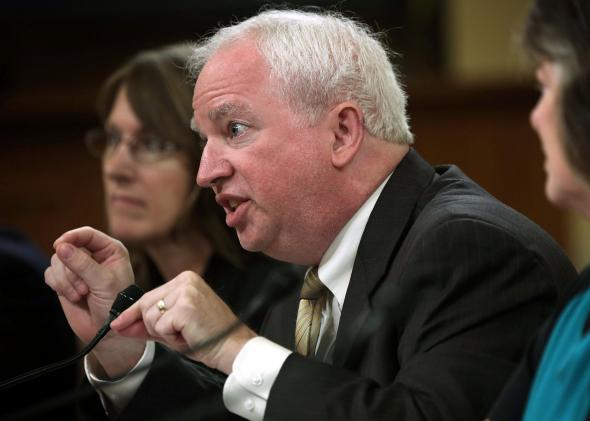On Monday, the Maine Ethics Commission announced its plan to slap the National Organization for Marriage with a $50,250 fine for breaking several state laws in its 2009 campaign to overturn marriage equality. According to commission investigators, NOM’s failure to register as a ballot question committee—and its startling refusal to file campaign finance reports for the almost $2 million it spent on the campaign—constituted a “significant violation of the law.” NOM could not have been surprised by the fine: When the commission began its investigation in 2009, the group had tried (and failed) to overturn Maine’s campaign finance disclosure laws in court.
This is hardly the first time an anti-gay-marriage group has contested, or flagrantly violated, disclosure and campaign finance laws. Opponents of marriage equality have long been staunchly opposed to any law that might monitor their spending or publicize their donor lists. The Maine report suggests that NOM also violated campaign disclosure laws in Iowa and New Hampshire—and lied about its malfeasance to a government agency. Supporters of Proposition 8 were forced to pay $49,000 in fines for failing to report more than $1 million in contributions. The Mormon church faced a $5,000 fine for failing to report staff contributions to the same campaign. And in 2009, an anti-gay-marriage group in Washington state claimed a First Amendment right to conceal the names of residents who signed a referendum petition designed to roll back gay rights in the state. (They lost at the Supreme Court, 8-to-1 and were subject to special scorn by none other than Justice Antonin Scalia.)
The motivation behind these groups’ vehement animosity toward disclosure laws of every stripe is quite obvious. As support for gay marriage grows daily, opposition becomes a political liability or even an embarrassment—just ask Brendan Eich, whose pro-Prop 8 donation six years ago remains, unluckily for him, a matter of public record. NOM assumes, probably correctly, that more people will donate to its campaigns if they can keep their activities secret. Plenty of Americans oppose gay marriage in theory but aren’t brave enough to confess their views in the public sphere. As a result, NOM and its ilk claim a principled First Amendment defense to disclosure and campaign finance laws, arguing that anti-gay Americans’ free speech is violated when their anti-gay political activities are revealed to the public.
There are two problems with this argument. The first is that it is untrue. In 2008, the Supreme Court sharply rejected the First Amendment argument, holding, essentially, that facing criticism for your political views is a fundamental part of the political process, not a constitutional violation. “There is no reason to assume,” Chief Justice John Roberts wrote, “that any burdens imposed by disclosure of typical referendum petitions would be remotely like the burdens the plaintiffs fear in this case.” Justice Scalia went a step further, castigating gay marriage opponents for their lack of “civic courage” and lamenting that “this does not resemble the Home of the Brave.”
The second problem is, unsurprisingly, the frustrating issue of hypocrisy. As Justice Anthony Kennedy noted in Windsor, gay couples “have their lives burdened” by gay marriage bans “in visible and public ways … from the mundane to the profound.” From health care benefits to adoption to joint burial, marriage bans conspicuously debase gay couples’ lives, demeaning them as unequal for all the public to see. NOM supporters promote this public debasement, donating money to anti-gay initiatives, signing petitions to revoke gay rights, flooding the airwaves with inescapable commercials that paint gays as perverted predators—and yet they themselves demand total secrecy and anonymity for their own actions. It’s a cruel and cowardly double standard, predictable given the source but depressing nonetheless.
As gay marriage becomes increasingly accepted in America, anti-gay activists will paint themselves as an ever more beleaguered minority, standing up for their right to dissent in the face of persecution and unpopularity. But the right to dissent does not include the right to strip gay people of their constitutionally guaranteed liberty under a cloak of total secrecy. As Justice Scalia noted in this very same context, “harsh criticism … is the price our people have traditionally been willing to pay for self-governance.” The anti-gay-marriage movement has apparently decided it is no longer willing to pay that price. Fortunately for the rest of us, this craven hypocrisy finds no shelter under the U.S. Constitution.
